Breathe. You are going to be OK.
It might not feel like it right now.
Your heart might be beating out of your chest with anxiety.
Tears may be streaming down your face.
There might be an empty blackness enveloping your insides – or perhaps this current sense of being overwhelmed with pain and sadness is the heaviest weight you’ve ever known.
Say this out loud with me. You have been OK before. You will be OK again.
I’ve suffered with bad mental health for at least a decade. I just didn’t know it.
After my mum’s death in 2009 I didn’t feel depressed. However, I did develop phobias which I assumed were related to bereavement: like suddenly becoming terrified of large crowds and tall flights of stairs which I thought I’d fall down.
Somewhere along the line, my grieving process morphed into anxiety. I began to worry obsessively about minor issues for hours; grew more self-conscious in social situations; found it difficult to leave the house without panicking. Yet I still just attributed it all to grief, telling myself that I’d eventually just ‘get better’.
By the time I was working on my memoir in 2015 I realised my mental health had taken a significant hit and decided to find a therapist. For the first time since my mum died, I finally began facing up to my poor mental health.
And then Dad got ill.
My dad died at the end of 2017, and my mental health has been significantly unstable ever since.
But you know what’s different now? I’m aware of my mental health problems. I recognise them.
I used to be scared of labelling myself as ‘mentally ill’ because it conjured up images of dangerous and overwhelming scenarios which I couldn’t reconcile myself as being part of. Yet the simple truth is that being sick mentally is just the same as being sick physically. There’s absolutely no shame in it – despite the stigma which still surrounds discussions of mental health.
It’s such a huge relief to know that I’m not afraid to talk about being mentally unwell. Sharing publicly how my grief has morphed into anxiety and depression, and how I’m coping with all of these things, feels like a big step towards recovery.
One of the most isolating things about poor mental health is feeling like you’re completely alone. But that’s simply not true.
How I track my mental health
In the last twelve months I’ve noticed a pattern to my emotions. The grief ebbs and flows like water at the shoreline; a few days of feeling alright, a few interim days when the skies seem to darken, a few days of unstoppable crying, and then back to the start again.
One of the biggest lessons I have learned from this pattern is how crucial it is to listen to my body.
My mind is often at odds with my physical self. There’s an overwhelming sadness which tells me repeatedly I’m much too devastated to even consider stepping outside – even though I feel my muscles twitch with the need for activity and movement. Then again, sometimes my body knows exactly what’s happening before my mind does: lethargy indicates the start of a depressive phase, and getting infections like thrush and cold sores immediately reminds me I’m pushing myself too hard and need to step back.
Why is self care important?
The phrase ‘self care’ has often sounded strange to me, but I’ve recently begun to understand that it’s less of an action and more of a process. For me, self-care is about learning to be kind and non-judgemental towards myself, and to put my needs first.
The major problem is that self care can be really difficult when you’re depressed (or when you’re anxious, or grieving, or in the middle of a panic attack).
That’s when many lists of self-care tips can come across as insultingly trite. “Run a bath!” they say, when you’re enveloped in your duvet surrounded by tissues and absolutely cannot contemplate moving. “Go for a run!” – as if the gut-wrenching sadness inside your skin will seriously allow you to lace up your trainers and open that front door.
These suggestions may come from a place of good intentions, but the people saying them aren’t where you are. They don’t realise that their well-meaning words might make you feel even worse. Self care looks different for everyone, so a large part of the self care journey is to determine exactly what makes you feel better, calmer, and more like yourself again.
Here are some self care strategies collected together by a person who’s been there.
I’ve been wrapped in that duvet, crumpled on that floor, fearful of that locked front door which hasn’t been opened in three days.
That said, remember that a list of self care tips isn’t going to cure you. They aren’t magic. But what they’ve provided for me is a little moment of respite: little nudges of gentle calmness which reduce my pounding heart and swirling stomach.
These attempts to care for myself include mantras, methods, actions and behaviours. Some are instinctual and others have been learned by experience, but all of them help me make it through my days of mental difficulty.
I hope they provide some comfort for you too.
Start small.
On my worst days, forcing myself to wake up properly, let alone get out of bed, has felt like too much. I’ve judged myself for it, and then I’ve felt worse.
But there’ll be other days. Whatever you can achieve right now is fantastic – even if it’s nothing more than drinking a glass of water.
Taking the pressure off yourself is a hugely important part of self care. You are good enough. The world may feel impossible today, but it might look different tomorrow.
Let yourself cry.
It’s OK to be upset. It’s OK to let go completely.
When we’re overwhelmed, crying is often automatic – but as we get older, many of us start to feel like crying is a sign of weakness and we should hold it in.
Yet crying is one of the most cathartic acts your body can self-manifest. A traumatised mind needs a physical release; a way for all the noise and movement and pain and confusion to be channelled.
There’s a difference between happy tears and emotionally sad tears, too. The latter hold stress hormones which are released from your body when you cry, making you naturally feel better.
- Don’t set a time limit on your tears. They’ll stop falling naturally when your body has exhausted the need to cry.
- Don’t be scared to cry in public. I’ve started sobbing on trains, in parks, on the pavement – and most of the time a lovely stranger has asked if I’m alright. Vulnerability sparks kindness.
- Equally, a good full session of crying alone can clear out old emotions with no worries about being observed.
I often feel the tears burgeoning behind my eyes like floodgates threatening to burst. Some days it’s a complete surprise and lasts for moments before it’s over; and on other days, those floodgates may open wider.
I let the floodgates do what’s necessary.
Ground yourself.
Touch the places in your current environment which feel familiar. Feel the white painted sides of the doorway; the carpets and floorboards with bare feet; the cold-steel tap before you run the water hot.
Find patterns. Find a rhythm. A beat. A routine. Any methods to slow your pulse.
Write.
Writing is one of the most powerful tools we have to process our thoughts. It’s a form of release – a catharsis.
Write the emotions you’re feeling right now. Write a list of what makes you happy. Write a stream of consciousness with swear words and slang words and spelling mistakes. Write the same meditative phrase two dozen times in increasingly messy handwriting if that feels right to you.

I type my mind out onto a laptop screen most days: just a few sentences, if that’s all I have to say, but sometimes it’s more. Sometimes it’s unintended essays of feeling, letters streaming from my fingers and my eyes skittering over the words without reading them.
I don’t often look back.
It’s the act of transference; getting thoughts out of my head and onto a page instead. I feel cleaner afterwards.
Sleep.
Apparently, we spend one third of our lives in bed – and if you’re suffering with bad mental health, you’re probably spending longer under the duvet than other people.
Of all the self-care tips which potentially cost you money, this is not the one to skimp on.
Soft lighting and comfy duvets; thick blankets and dozens of pillows; hell, even a four-poster if you’re so inclined! Your bedroom should be a place which calms you down and allows you to recharge.
But bad mental health can still get in the way of sleeping well. When I moved back to my dad’s house I began sleeping on a sofa bed for what turned out to be almost ten months. I tossed and turned at night, both anxiety ridden and in an uncomfortable situation: my sleep suffered, which meant my mental health suffered.
When I finally bought a new bed, I went all out: a fancy mattress-in-a-box, the biggest one I could find – and I don’t regret it for a moment.
Go outside.
Walking in nature takes you away from your screens and away your whirring pent-up thoughts to remind you that we’re all irrevocably connected to the outside world.
Take a train to the countryside and walk without direction until your cheeks are flushed and your calves ache. Stand outside your front door or sit exhausted in the garden. Allow the fresh air to wash over you. Absorb the sunshine, the breeze, the dark clouds, the rain.
Sometimes one type of weather is better for your mental state than another. Sometimes your reasons and your preferences change.
I often find it hard to take my own advice. As the weather gets colder I hunker down inside: if I have no errands to run and no plans with friends there’s seemingly no reason to leave the house. I spend three days with the front door locked, and forget that my mental health depends on connecting with the outside world.
So then I open the door.
Touch the earth.
Search out the closest green spaces. Go to parks and hills and forests and cemeteries. Be grateful for trees everywhere, and absorb how calming they are. Think about how long they’ve been quietly living and breathing in the same place.
Visit a garden centre and hold, smell, and touch the plants. Watch roses blooming on bushes. Investigate how spiders move on blades of grass. Get your hands into the soil. Grow your own green things.
I sit in my garden to feel calm.
My parents didn’t spent a lot of time out here, but I know my mum loved the fact that it was hers. Occasionally I’d see her kneeling on the soil, happily wielding a silver trowel and dramatically shouting at the snails.
Now I find a strange peace borne of physical activity; the act of picking up a pair of secateurs and snipping back the bushes which I’m responsible for. I pull at long, tangled strands of ivy; grab at handfuls of dried leaves; rake at the dusty earth and see soil beneath. I begin to plan a different garden. One I can call my own.
Move your body.
There is pent-up energy stored inside you. It grows stagnant if it stays in one place, so we need to move it outwards. This is not the same as exercise. Let your body move itself. Don’t think. Put music on and allow your limbs the freedom to stretch in all the ways they need to.
Intuitive dancing. Yoga. Star jumps. Shaking. Walking. And, yes, running.
You can try to run; realising the aching lungs you’ve always hated are actually a perfect distraction; feeling grim determination as your feet hit the ground. You find yourself smiling breathlessly at other runners, mums with pushchairs, elderly ladies on park benches. You realise how many other people need green open spaces at 5pm on a Monday.
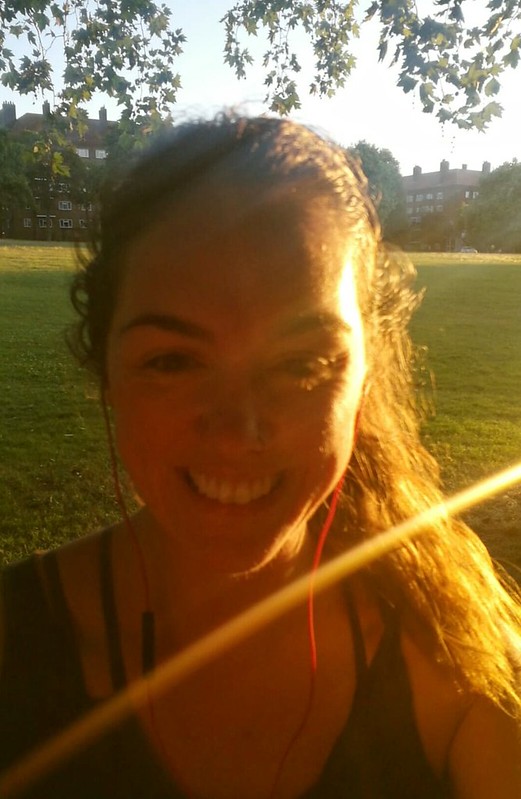
I don’t miss movement until I’m doing it, and then my body silently thanks me (or does so audibly, with a number of clicks in strange places).
I walk five minutes to the park close to my house. I put headphones in my ears and let an app tell me when to run and when to walk. I don’t choose which pathway to take: I let my feet decide. I listen to heavy, pulsing music and allow my body freedom to exert itself without thinking. Even if I didn’t like the idea at first, I always feel better afterwards.
Eat.
There are foods which are good for you, and foods which make you feel good.
The act of eating is self-care in itself, but so is the preparation. Chopping, stirring, mixing ingredients together: it’s cathartic, and it engages your focus on something other than your thoughts.
Buy the basics – onions, garlic, tinned tomatoes, rice, pasta. Write a list of easy-to-make recipes which make you feel cared for. Order takeout for dinner and don’t feel any guilt. Know what you like and order it when you want it.
I operate on a sliding scale of ease, comfort and health. Crisps, biscuits, carbs and ready meals are my biggest vices, so I try to compromise with simple recipes I know I can make easily and also love to eat. Scrambled eggs on Marmite bagels with a side of mushroom and spinach. Pasta and cheese, plus whatever vegetables in my fridge thrown into the sauce.
I see no shame in ordering delivery – sometimes it’s entirely necessary – but a good half-way option is a recipe box delivered to your door. I spent much of last year cooking meals from Gousto, which allowed me to get back into cooking without having to make meal decisions based on what I had in the kitchen which my grief-stricken brain simply found too overwhelming.
I chop onions and garlic, turn on the heat, allow them to sizzle. I remember how my dad loved to cook, and how much I loved his homemade curries, his steak and kidney pies, his chili con carne with a separate ‘non-hot’ batch made especially for me in a green ceramic pot.
Now I cook more than I can eat, and store things in the freezer for when I’m not doing so well.
Drink.
Drink water. Lots of it, with slices of lemon, or chunks of fruit. Feel your body wakening in response.
Drink a beer. Drink a whisky. Drink another beer. Feel that delicious lethargy in your body as the alcohol seeps through your bloodstream.
Or maybe avoid alcohol altogether. Perhaps it’s not a good choice for you.
Drink tea. Herbal ones in pre-made teabags, or a creamy cup of rooibos (which is non caffeinated), or hot water with fresh ginger, a squeeze of lemon, a spoonful of honey.
Avoid caffeine.
I used to drink coffee every morning like it was a ritual, and I swore I couldn’t get into ‘work mode’ without it.
Yet when I begrudgingly tried cutting out coffee, I quickly learned how much it affected my anxiety: without it I feel much less panicky, my heart beats slower, and my mind doesn’t race into overdrive. More surprisingly, I can still work perfectly well without it.
Now I judge what the day holds for me before I even consider the idea of a cup of tea or coffee. And although I miss coffee’s flavour and the daily ritual, I don’t miss the stomach flutters.
Listen to your body.
Learn the way your body feels before you need to unleash emotion. Understand how tears rise through your throat and behind your eyes.
This is otherworldly. You may not remember how life looked before this: or, you may remember with startling clarity.
This is trauma. Recognise it. Your body is trying to find ways to recover. If that’s spending a day in bed, do it. If that’s napping in the day, do it. Post traumatic stress disorder isn’t just something faced by soldiers in combat.
When you feel your heart pumping too violently in your chest, stop whatever’s happening and pay attention. Give your body the chance to tell you what’s wrong.
Shower.
Feeling like I can’t be bothered to shower is one of the first indications I’m getting depressed. It’s the amount of effort involved: I have a complete lack of motivation which leads to self-disgust and thus even less motivation.
To combat this, I have to remind myself of the joys of water.
It’s not about bath bombs and decadent bubbles and atmospheric candles – although all of these things can be lovely. It’s about remembering the relief when hot water touches your skin; the steam which rises around you and sloughs off the dirt; the meditative quality of working soap into a lather then methodically cleaning yourself.
Switch off.
For the six months when I acted as carer for my dad, I was on constant high alert. Any possible noise was immediately interpreted as a doorbell, a phone ring, the bell I gave him to use when his voice got too weak. I began to invent these sounds when they weren’t real. It began to drive me crazy.
After his death I realised that same spike of anxiety still crashed through my body whenever I heard my phone ring or vibrate – so one day I simply switched all my notifications to silent. My phone can still ring, but only by playing a pleasant, soothing piece of classical music. My sanity is all the better for it.
But I’m still guilty of watching time move relentless forward.
I watch the phone. I watch the clock. I can easily fritter away an entire day by worrying about the thing I have to do at 7pm; constantly checking to see how many hours I have left before I should start preparing. This is anxiety, pure and simple – and it sucks.
Putting my phone in another room helps. So does working in a space without a clock in it. Another option is to turn that anxiety on its head, and actively give myself a time out.
Be still.
It’s OK to take a self-care day.
Gift yourself twenty four hours of your own space with zero interruptions. Switch off your phone. Close the curtains. If your home is too hectic, find a hotel room or a friend’s house who’ll be away all weekend. Sometimes your usual physical space is too evocative of the struggles you’re facing.
Allow the emotional onslaught to fade into the background. Take time to just ‘be’.
Be mindful. Notice only the present.
My biggest concern with anxiety is that I can quickly fall down a rabbit hole of predicting the future – also known as anticipatory anxiety. If I let my mind loose it’ll fixate on a topic and relentlessly imagine all the worst possible scenarios and outcomes. It’s exhausting and completely pointless, but also pretty hard to stop.
One method I’ve found is saying, “Ok, right now I feel…” as a way of internally grounding myself to only pay attention to what’s happening at that exact moment. Am I tired? Do I feel slightly hungry, or slightly sad? Externally I focus on what I can see, touch, taste, smell and hear around me (commonly known as the Five Senses Technique), and usually my breathing begins to slow.
Identify your triggers.
Self care is an introspective process. By investigating how to help your mental health issues, you’ll begin to notice what helps and what hinders your mental state in daily life.
Currently I don’t do well with crowds, or high energy situations, or when my loved ones are stressed around me. My anxiety rises when I’m not in control or feel overwhelmed, so I’m learning to catch these moments before they properly affect me and either removing myself entirely or employing various techniques to reduce the anxiety. Slow breathing while counting the seconds. Repeating mantras in my head. Physically giving myself space.
Set boundaries and say no.
If you’re naturally a people-pleaser, it’s extremely difficult to put yourself first at the expense of others. We tend to feel absurdly guilty for giving our own needs and desires equal (or greater) importance than the needs of those around us.
Unfortunately, saying ‘yes’ when you don’t mean it can be really destructive for your mental health.
In the past, I’ve handed over the responsibility of many situations to other people. I’ve remained in uncomfortable situations because I don’t want to rock the boat. I’ve assumed people are going to doubt me, and I’ve felt demolished when someone disagrees with my opinion.
Simply put? I find it very difficult to say no.
Setting personal boundaries in my life is new for me, and I still find it quite uncomfortable. But I also know that, for the sake of my sanity, it’s absolutely necessary. I have to accept that saying no might result in someone being upset or annoyed with me, but that it’s OK!
When you’re honest about your feelings and know you’re only engaging with things you actively want to be involved in, there’s a huge sense of relief.
(NB: If you haven’t watched it, Sarah Knight’s TED talk on ‘The Magic of Not Giving a Fuck’ is a must-see.)
Trust your intuition.
Self care is intuitive. Only you can truly know what you need or don’t need. Listen to your gut; to that little voice inside; or even to your body, which often exhibits symptoms of stress that your mind hasn’t processed yet.
That said, don’t worry if your intuition has deserted you. The second-guessing nature of anxiety can often cause self-doubt. But that feeling of intuition will come back: it doesn’t disappear. And some of the following tips are great ways to tap back into that intuitive sense of yourself.
Create (or not).
Get a keyboard. Take photographs. Get a watercolour set and a sketchbook and paint how you’re feeling.
However, if you’re naturally a creative person you might find your creativity is at a low. Writing is my outlet and yet I’ve spent months feeling unable to write. I don’t have inspiration – or, rather, whenever I feel I can write and I begin to attempt it, suddenly the exhaustion and slight nausea sets in.
That’s OK. Self care is all about doing what’s best for you in the current moment. Don’t force yourself to do something which doesn’t come naturally right now.
Be mindless.
Sensory distraction is an absolute blessing.
At really overwhelming moments during Dad’s decline when I felt my heart beating out of my chest, I would grab blindly for my phone and open Candy Crush. This was the most unexpected anxiety solution for me – I’ve never been someone who plays games on their phone – but apparently the sheer banality of swiping brightly coloured candy is exactly the distraction I needed.
In moments of high stress and anxiety, sometimes you need an external source to distract you. In the year following my dad’s death I binge-watched multiple seasons of dozens of shows on Netflix, and I don’t regret it for a moment.
Orange Is the New Black, Breaking Bad, The Walking Dead, Grey’s Anatomy: all compelling dramas which completely involve you in the lives of other characters and takes the focus away from your internal worries.
Read.
When binge-watching Netflix just won’t cut it, I pick up a book.
Reading has always been a solace for me, but when my mental health is bad I choose my books carefully: fiction for distraction; non-fiction to see how others cope; short stories when my attention span is minimal; poetry when I need delicacy and beauty.
There is an increasingly messy pile of books beside my bed. Depending on how I’m feeling I’ll read a chapter of one, a few pages of another, and suddenly sink three hours into a novel I put aside months before. It’s not the best technique, but it makes me feel better.
Some non fiction books which have helped me deal with my mental health and made me feel less alone are:
- ‘Reasons to Stay Alive’ by Matt Haig (although most of his books are equally fortifying for mental health sufferers)
- ‘The Wild Other’ by Clover Stroud
- ‘The Outrun’ by Amy Liptrot
- ‘H is for Hawk’ by Helen MacDonald
In terms of fiction? It totally depends on your taste, but some of the most engrossing books I’ve read recently include:
- ‘The Power’ by Naomi Alderman
- ‘Little Fires Everywhere’ by Celeste Ng
- ‘Eleanor Oliphant is Completely Fine’ by Gail Honeyman
- ‘Dark Pines’ by Will Dean
Meditate.
A calm mind changes your behaviour and how you perceive the world around you. Meditation is something I avoided for the longest time, but eventually I downloaded the Headspace app and told myself if I couldn’t carve out ten minutes every day to dedicate to quietening my mind then something was seriously wrong.
It’s been over three months, and every day I sit with Andy Puddicombe’s voice in my ear, gently instructing me to scan through my body and focus on my breath. Sometimes it’s the last thing I want to do; but on other days I feel a languid sensation wash over me as the anxieties subside.
Meditation quiets the mind. It slows the progress of worrying thoughts, allowing you instead to recognise them and let them go.
Be kind to yourself.
It’s very easy to self-criticise and self-chastise, and I do it too much. Practicing self-care means addressing yourself as if you were your own best friend, and being as kind and caring as we are with those we love.
I have to actively say to myself (out loud, if it helps!), “I love you. This is hard. But we’re going to get through it, bit by bit.”
Stop blaming yourself for a mental illness which isn’t your fault. Accept that you’re currently unable to fire on all cylinders, and allow the guilt to be washed away by generosity instead.
Let go of ‘shoulds’.
“I should be doing better. I should be able to meet that person for dinner. I shouldn’t spend all day in bed. I shouldn’t be crying this much…”
An anxious person’s life is often disrupted by second-guessing their actions. I question my decisions on a regular basis – but I’ve recently begun to realise that everything’s much easier if I just let that shit go (NB: listen to this meditation if you’re so inclined. It’s honestly changed my life!)
Don’t look ahead to next month, or next week, or even to the end of today. Just think about what the next few minutes hold for you.
Make achievable lists.
I am a serial list maker, and I often overwhelm myself by writing too much down at once. I feel obligated to list every possible thing that needs doing, when in fact I’m more likely to achieve two or three big tasks in a single day.
On bad mental health days, a task list could be entirely comprised of getting dressed, making breakfast, turning on the washing machine, going to the corner shop for milk. Some of these could be too overwhelming for today. That’s fine. But you know that you’ve achieved plenty on previous days, right? So make it easier for yourself today.
Recognise distorted thoughts.
‘You’ are separate to your anxiety. To your depression. To your OCD. To your mind, essentially.
The more I’ve faced up to having these mental health problems, the more I’ve noticed that I say, “Oh, my mind makes me think this or that.” I didn’t even realise until a friend pointed it out!
Distorted thoughts – the ways our mind convinces us of things that aren’t true – are commonplace with poor mental health. Some conditions, like OCD, are very sneaky creatures: they weasel their way into your thought process and pretend to be so rational and normal that you think they’ve been there all along. They also make it extremely hard to remember how you used to feel without them.
I’ve found that doing CBT (Cognitive Behavioural Therapy) is really helpful for recognising that these thoughts don’t belong, and that you absolutely can overpower them. It’s all a matter of isolating them, challenging them and effectively shoving them back in the box they came from.
Name your mental health problems and visualise them.
Giving a capital letter to Depression gave me freedom. I spoke to my reflection in the bathroom mirror and, almost laughing through my tears, told myself, “I mean, you definitely do have Depression.”
How did I know? Because even after losing both my parents I’m still being cruel to myself.
My therapist has helped me see the identifying characteristics of my depression, my anxiety, and my grief. They behave in different ways; they feel different when they manifest in my body and my mind.
It’s helpful. They become a bit less daunting as a result.
Find your mantras.
Words have always been soothing for me. When Dad was dying, I stored away the mantra-like phrases which people said to me and repeated them when I was on the verge of panic:
“Slowly, slowly.”
“Breathe deep.”
“You are strong, fierce, and courageous.”
When you feel a phrase resonating with you, write it down. Take those words and turn them into mantras: phrases you can draw strength from on your darker days.
Find animals.
Having animals around you can boost your self-esteem, reduce feelings of loneliness, and bring you back to the present moment. They also know how to curl up next to you and demonstrate a prime example of unconditional love and support.
On the night my dad died, I was at home alone with Ernie the dog. He laid his head on my knee as I heard the news from the hospice on the phone and he wouldn’t leave my side all night, pressing his body into mine where ever he could.
Find the nearest dog, cat or equally cuddly creature and deposit them firmly on your sofa. Buy them treats. Let them sleep on you. Watch how adorable they are.
I leave the garden door ajar and the neighbourhood cats come sniffing curiously at the steps. I squat down on the ground and let them rub their faces against my hand or my knee. I listen to them purring. I let them wander inside to investigate a brand new environment (and secretly hope they’ll like my home enough to stay).
Talk to people you trust.
Over the last few years, I’ve regaled my friends, various therapists, and unknown voices on other ends of helplines with stories about my mental health and grief. I’m incredibly lucky that they’ve given me their time, their full attention and their unwavering compassion whenever I’ve asked for it.
It’s not the solution for everybody, but I firmly believe that a problem shared is a problem halved. I couldn’t have coped with all of these emotions alone – and you don’t have to either.
If you don’t feel comfortable speaking to your friends and family about your mental health, I’d recommend finding a therapist. The most common options are:
- Therapy through the NHS: go to your local GP’s office and talk about your options. The good news is these services are free, but they might involve long waiting times.
- Therapy through your local council: I applied through my council’s website and received a call from a support worker, who then referred me to an online CBT course (Cognitive Behavioural Therapy).
- Therapy through a charity or hospice: my dad was at a fantastic hospice and they offered both of us sessions with a family worker, both during his decline and after his death. Charities like Cruse and Marie Curie also offer bereavement counselling.
- Private therapy: If you’re willing to pay for therapy, there are probably hundreds of therapists in your local area. I used counselling-directory.org.uk and read through profiles until I found a few I liked, then sent them an email explaining my backstory and went on from there!
If you’re not confident about meeting face-to-face, there are a number of helplines (all UK based) which you can phone up for a chat. They include:
- Mind: 0300 123 3393 (or text 86463)
- Cruse Bereavement Care: 0844 477 9400
- Marie Curie: 0800 090 2309
- Anxiety UK: 03444 775 774
- Samaritans: 116 123 (helpline is open 24 hours)
Ask for love, as well as help.
Friends, family, random acquaintances and even strangers want to know how they can help you, but sometimes it’s not logical actions you need.
It can be hugely supportive to know someone is thinking about you without you having to remind them – because bad mental health can often feed off the idea that “I’m alone because nobody truly cares about me”.
After a particularly bad week of self-imposed isolation and a lot of crying, I set up a WhatsApp group with some of my closest friends. I named the group, ‘Flora is going to be OK’, and asked them to check in with me when they could. Immediately I had streams of replies – one friend said she’d said me hilarious cat memes each and every day – and now whenever I see a notification from that chat it makes me grin.
You can ask your friends for daily check-ins, or weekly ones – whatever you feel you need. Just make sure the people who love you understand how important it is for them to show it.
Look for happy moments.
Did you know that bright green wild parakeets live in the treetops in London? I’ve seen them flying above parks all over the city. Their origins are an urban legend, but every time I hear them squawking their way across the skies I grin so wide my face aches.
Record the little weird unexpected moments you see each day: standing beside a lake in central London under a hangnail moon with sleeping swans; pausing on a dry patch of pavement in December drizzle to type out my mum’s voice saying a phrase I thought I’d forgotten. These are the moments worth keeping hold of. They make us brighter and make us happy.
I have a note on my phone where I write positive interactions and beautiful observations. Sometimes I record my emotional reactions too.
What does that positivity feel like? That spacious lightness inside your chest? That bolstering feeling? How does it differ to that leaden, solid weight of grief which pulls on your insides like a pendulum and prevents any real movement, any real feeling?
Be angry.
We think we’re supposed to bottle up our emotions, but you are absolutely allowed to be angry. Dealing with mental health issues can be an emotional onslaught: fear, sadness, distrust and anger can (and probably will) all rear their heads.
So feel your fury. Allow it to sit there. Let those burning, heated sparks fly. Scream into pillows. It all helps.
Clean, clear and re-organise your space.
After three days of ignoring the dishes in the sink, I suddenly have a fervour for cleaning. The entire kitchen is blitzed, with every surface left glistening; the laundry is loaded; the bed sheets are changed.
Creating a clear environment by clearing away what’s stagnant is cathartic. Moreover, engaging in repetitive activity is strangely calming.
By the time I’ve organised, my mind is refreshed. I have clarity again.
Set up routines and rituals.
I’ve spent much of the last decade travelling all over the world. For about six years it was long-term and constant; then it was a few trips each month while renting a flat in London. The idea of establishing routine in my life was all but impossible: I was never in one place for long enough.
And now?
I’ve discovered I feel most calm when my day has an obvious structure. I meditate each morning. I make toast and tea in my kitchen. I reply to emails, settle down to writing, eat lunch and see friends. I recently started a part-time job at a pizza restaurant to get me out of the house, and I make sure I have at least two big social events each week.
Routine was never something I craved – until my life became so erratic, unexpected and traumatic that I developed mental health problems.
Part of the joys in developing a structure to each day is that I get to include a self-care routine, too.
Remind yourself you’re loved.
This is the passive version of ‘talking to people’ – for those moments when you’re in need of your own space.
Take screenshots of supportive texts or emails from friends and add them to a folder on your laptop or phone. Collect photos of people and places which make you happy. Write a list of the memories and moments when you’ve felt the happiest. Remember the most confident times you’ve ever had: when you first climbed a tree or rode a bike or went to school by yourself. You are brave. You are strong. You are courageous.
Try your hardest to negate your feelings of unworthiness with the true knowledge that your support system loves you, and that you are enough.
Know that this is temporary.
Tell yourself there is a way out of this. Because there always is. Overwhelmed, bruised, and damaged: however bad you feel right now, know that it’s surmountable.
You’ll be ready when you’re ready.
Hard, bright and glittering. Broken and bruised, but still here. You are gearing your energies, pooling your internal resources, waiting patiently for the moment when your mind and body come back to life and you step, willingly and fully, into the world again.
You’re going to make it through this. I promise you.







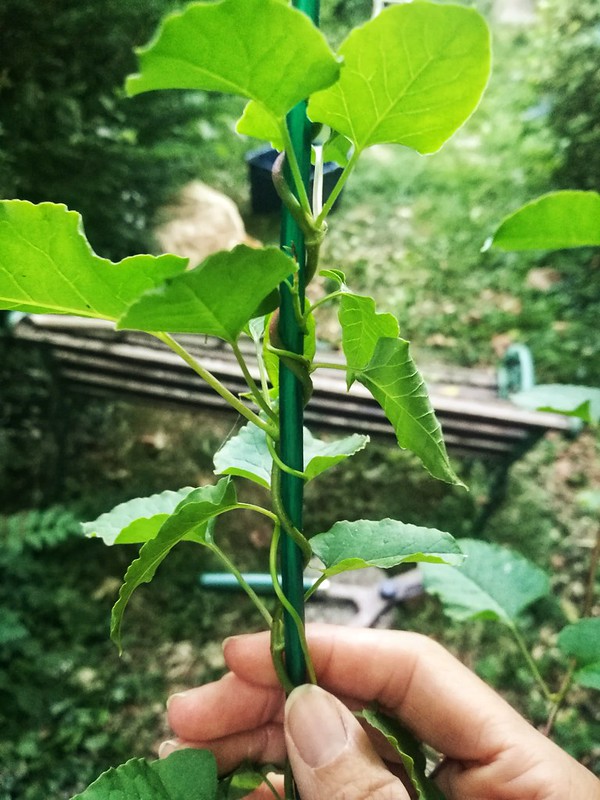
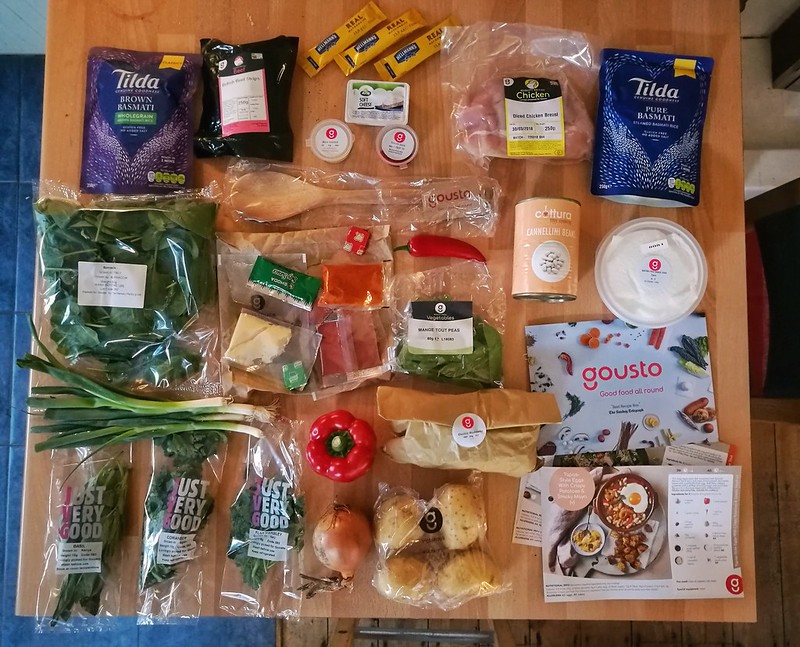


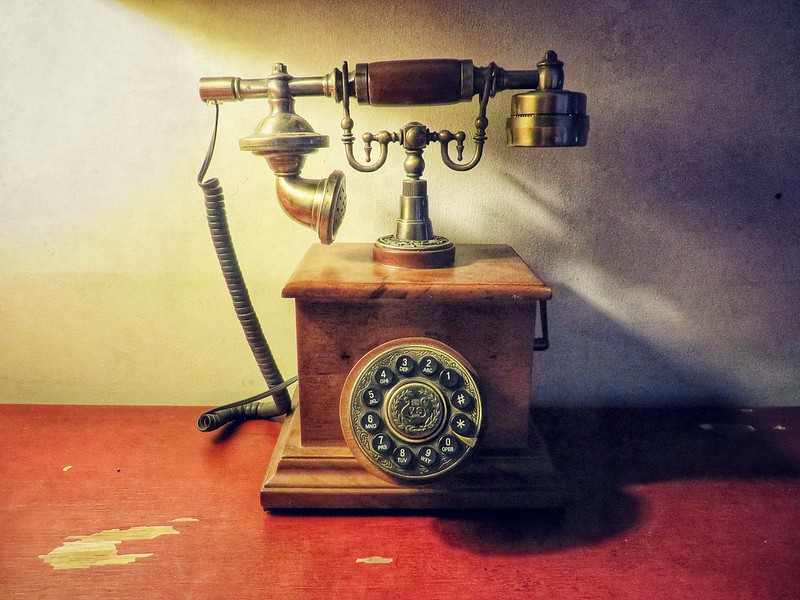


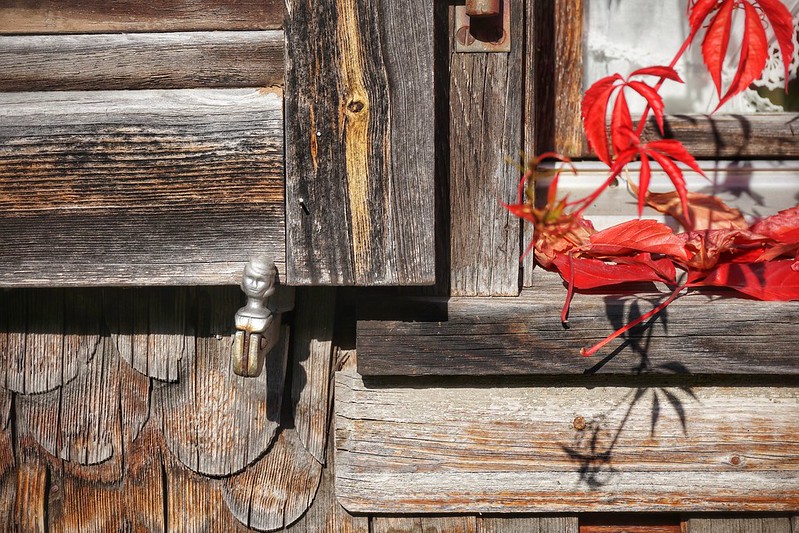

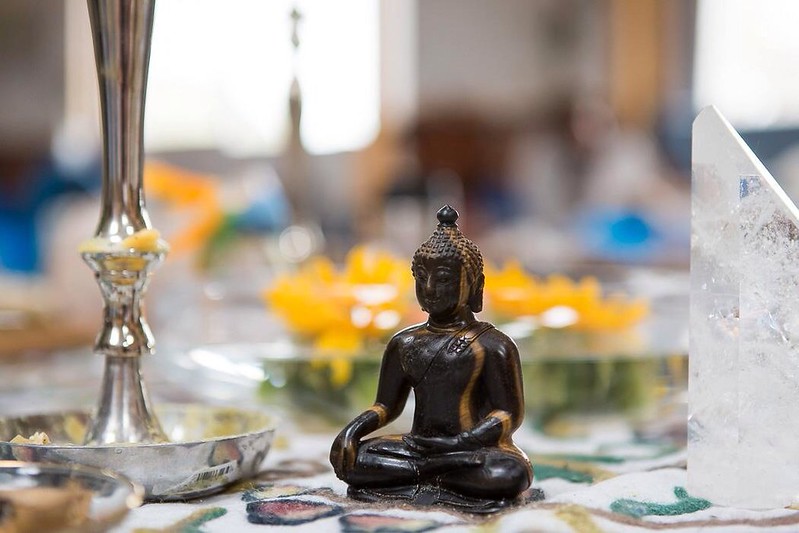
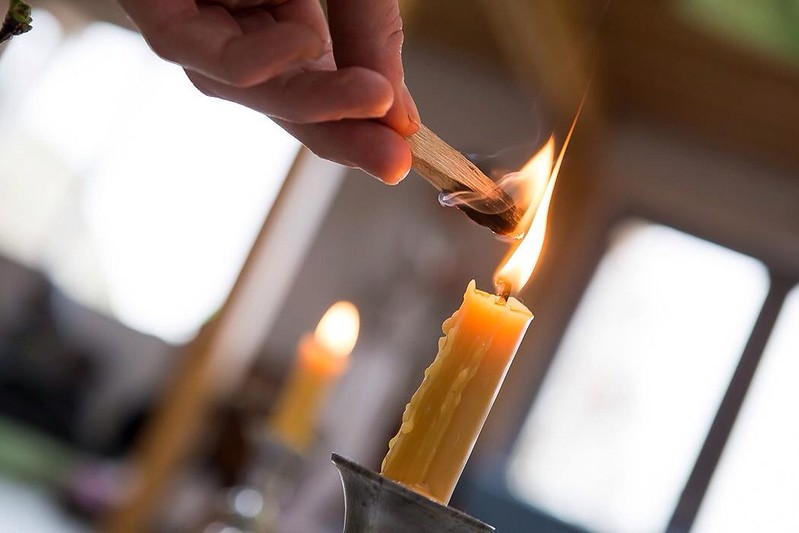


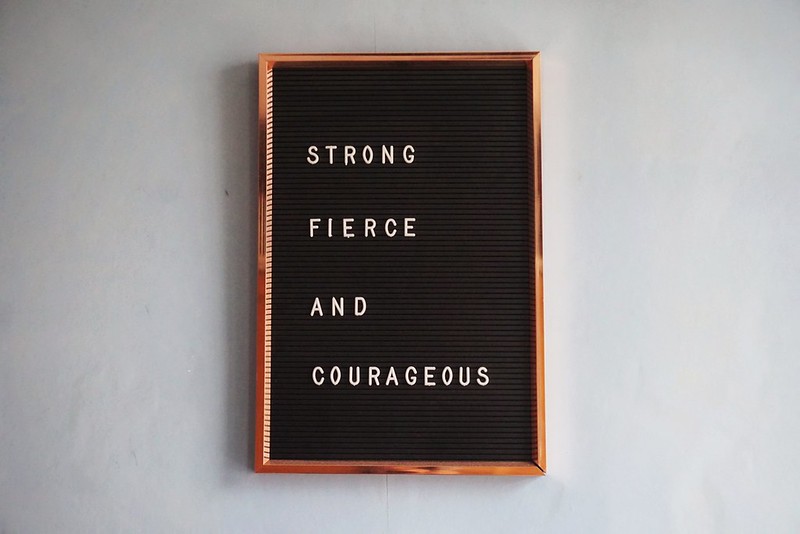





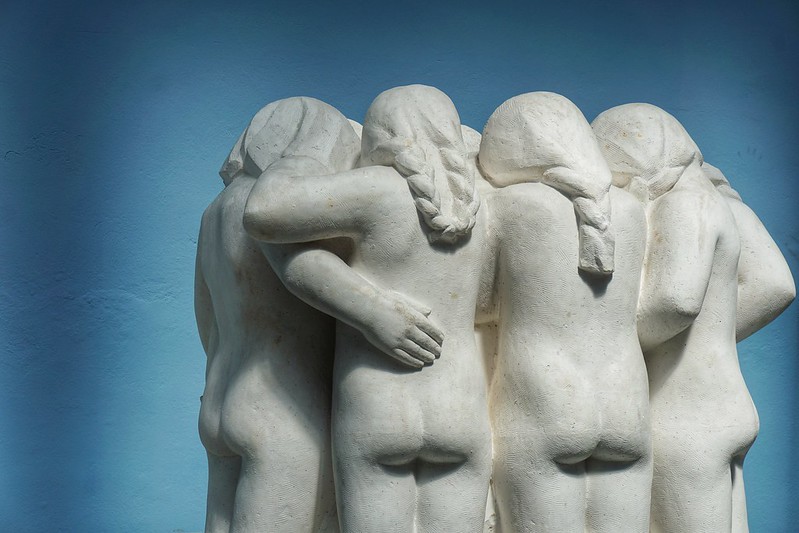




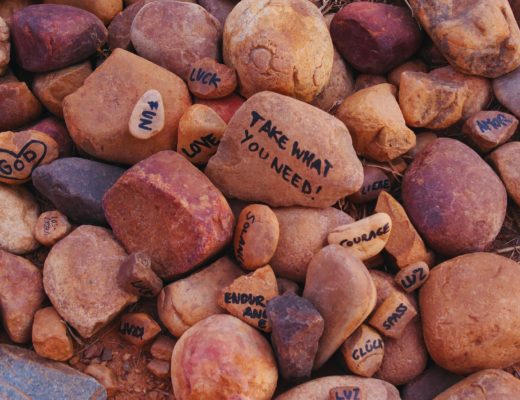
17 Comments
ldf984
January 26, 2019 at 3:01 pmThis resonates so much with me. I had a rather difficult 2018 and believe that I also fell into a depression and had my anxiety intensify – something that I couldn’t really see at the time but recognize now that I’m through the worst of it. I find a lot of what you mention here is crucial to my mental health as well and it’s useful to have it all written down in one place. I’ll likely be returning to this often as a gentle reminder to check in with myself. Thanks you for sharing this!
Flora
January 28, 2019 at 11:38 amThanks so much for sharing your experiences with depression and anxiety! And I’m so glad to hear you’ve got through to a better place 🙂
Penny
January 28, 2019 at 12:59 amIn the midst of my own anxiety this evening, I’ve stumbled upon your post. Words are evading me right now, but I wanted to say thank you nonetheless. This is something I will be bookmarking and coming back to often.
Flora
January 28, 2019 at 11:40 amThanks so much Penny – I hope you’re doing a bit better this morning! And if not, just be gentle with yourself 🙂 Sending love xx
Megan
February 7, 2023 at 3:00 amMy sentiments exactly.
Ladies What Travel (@LadiesWTravel)
January 28, 2019 at 3:31 pmFlora, this is such a good article – it’s full of so many different approaches and that’s the thing, depending on the person, the day, the problem what we need changes. As an adult I’ve gone through three bad bouts of depression now, the latest throwing in a big chunk of anxiety issues just to jazz things up. So many of the things you mention bring back similar memories of moments for me, and I think it’s just wonderful that you’ve shared them, it means so much to know how we feel is ok and we’re not alone.
One thing Im going to take away is your idea of a group chat. I’m one of those people pleasers, and when I feel shitty I just shut down because “I don’t want to be a burden”. I hope I don’t get that bad again, but if I do I’m gonna set up a group of my own and let my friends know when I need that bit of extra love. Keri x
pickard50, Steven Pickard(sr)
January 29, 2019 at 4:03 amWell written and explained. It’s a blessing that you’ve realized your spirit is in charge of your soul and body. Your spirit is not your soul nor your body, as you’ve discovered. The ‘you’, Flora, is the assuring boss of the subordinate soul and body. What a blessing to know you realize this. May you prosper and grow and be in health always.
Elina
February 2, 2019 at 2:20 pmThis is amazing. You are such a great writer, and your openness about your mental health problems is inspiring. I think many people find it intimidating to know that someone they love isn’t doing fine because they feel like they don’t know what to do, and they end up doing nothing. I hope these people also read this article because I feel it will definitely help them understand what their loved ones are going through.
I agree on a lot of these things, for me writing and especially mindless journalling that I’m not going to go back to read has helped a lot. Especially writing by hand.
Saoirse Mullan🌸 (@saoirsemullan)
February 8, 2019 at 10:47 amBeautifully written and couldn’t have said it better myself. I recently lost my mum in September last year and the depression and the grief has deeply effected me in all aspects of my life. Definitely going to re-read this article regularly to remind myself it’s ok not to be ok right now. So thank you for sharing it. 🙂
Reid
February 8, 2019 at 9:52 pmFlora. Thanks so much for this.. As I told you I lost my father in 2017. Than following that I lost a cousin followed by two neighbors were very close to me.. My life has been a constant up and down. Tears mixed with feeling of why him.. I had thought my life was falling apart.. You story helped me a great deal move on with my life and see the clarity in everything letting me know I am not alone in the world.
Aaron Philips
February 9, 2019 at 4:18 pmThis is so spot on, thank you for sharing! Your courage is very inspirational.
Cloyster
April 30, 2019 at 12:58 pmThis is amazing article, I saw something like this after a long time. Thank mate, I really appreciate it.
2019 Reading Challenge: What Books Did I Read Last Year?
January 16, 2020 at 5:13 pm[…] It was the year I re-discovered the joys of owning a library card. The year when going to bed with a book became one of my most treasured ways to both fall asleep and practice a bit of self-care. […]
VIKAS BHASKAR
May 15, 2020 at 2:22 pmHave went through almost all your articles and being someone who has been in the same boat such as yours (with almost similar timeline) and yet trying to succeed every day from all the things grief brings along, your content does not only summarizes the struggles people like us face and cope up the hard way but it also brings an ease of way which can help the fellow community of people!
Only few share their turmoils in a beautiful manner so that others can learn from the readings, rather than experiencing the hard ways.
May we both have a happy and fulfilled life!
My best wishes for you!
From New Delhi, India.
How I Cope With The Loss of My Parents at Christmas
June 8, 2020 at 11:58 am[…] begins. I hate it – but I know that sensation extremely well now. And I just have to respect that self-care and compassion has to be my main focus throughout the […]
Vanessa
June 4, 2021 at 3:57 pmGreat article Flora. Really helpful to me after having lost both my parents in my 30s too.
Self-care strategies for achieving success at home | Digital Product Review
November 2, 2024 at 7:44 pm[…] online resources and communities dedicated to self-care and wellness. Websites like Flora the Explorer offer strategies tailored to improve mental health. Engaging with community forums allows you to […]